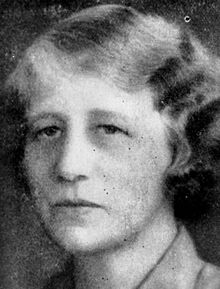Ursula McConnel facts for kids
Quick facts for kids
Ursula McConnel
|
|
|---|---|

Ursula McConnel, Queensland, approx 1938
|
|
| Born | 27 October 1888 |
| Died | 6 November 1957 (aged 69) |
| Nationality | Australian |
| Citizenship | Australian |
| Alma mater | University of Sydney |
| Known for | Work with Wik Mungkan people, Cape York Peninsula |
| Scientific career | |
| Fields | Australian anthropology |
| Influences | Sir Grafton Elliot Smith, W.J. Perry, Alfred Radcliffe-Brown, Edward Sapir |
| Influenced | Anthropology of Aboriginal people of Cape York |
Ursula Hope McConnel (1888–1957) was an amazing Australian anthropologist and ethnographer. She is most famous for her important work with the Wik Mungkan people. These people live in the Cape York Peninsula in Queensland.
Ursula was one of the first women to study anthropology. She then traveled to remote areas to learn about Aboriginal Australians. She carefully wrote down, recorded, and described their culture, stories, beliefs, and how they lived. She first trained in London and later studied under Professor Alfred Radcliffe-Brown at the University of Sydney.
Ursula's Early Life
Ursula McConnel was born on October 27, 1888. Her family lived on a large farm called "Cressbrook," near Toogoolawah, Queensland. She was the eighth of many children.
Even from a young age, Ursula was very smart and had a strong mind. She went to Brisbane High School for Girls and New England Girls' School in Armidale. She won many awards for her studies. Later, she earned top honors in philosophy at The University of Queensland.
Ursula was known for being brave and thinking for herself. She was very dedicated to her research. She never married and used her own money to support her studies. She felt it was her duty to help and understand the people she worked with.
Her Education Journey
Ursula showed great talent in singing and languages while at New England Girls' School. When she was 17, she went to King's College London. There, she took classes in history, politics, literature, and music. By the time she was 20, she had finished her studies at the University of Queensland. She earned a first-class honors degree in philosophy and psychology.
At 35, she started a special degree in anthropology at University College London. However, she felt lonely and unwell, so she returned to Australia in 1927. She didn't finish that degree. Back in Australia, she began doing research with the Wik Mungkan people. This work was guided by Professor Alfred Radcliffe-Brown at the University of Sydney.
Her Important Work
Between 1927 and 1934, Ursula McConnel made five trips to the Cape York Peninsula. She wrote many articles and a book called Myths of the Munkan. These writings were mostly about the Wik Mungkan people and other Aboriginal Australians in the area.
During this time, she also received a special award called a Rockefeller fellowship. This allowed her to study with Edward Sapir at Yale University in the United States. In 1936, she wrote a series of articles for Walkabout magazine. These articles shared her research with the public. They also showed her concern about how the government and missions treated Aboriginal people.
Ursula tried to get her doctorate degree from University College, London, by sending in her published works. She never officially received that degree. However, her work created a very important foundation for all the anthropological research done today among the Aboriginal peoples of that region.
Images for kids
 | James Van Der Zee |
 | Alma Thomas |
 | Ellis Wilson |
 | Margaret Taylor-Burroughs |


